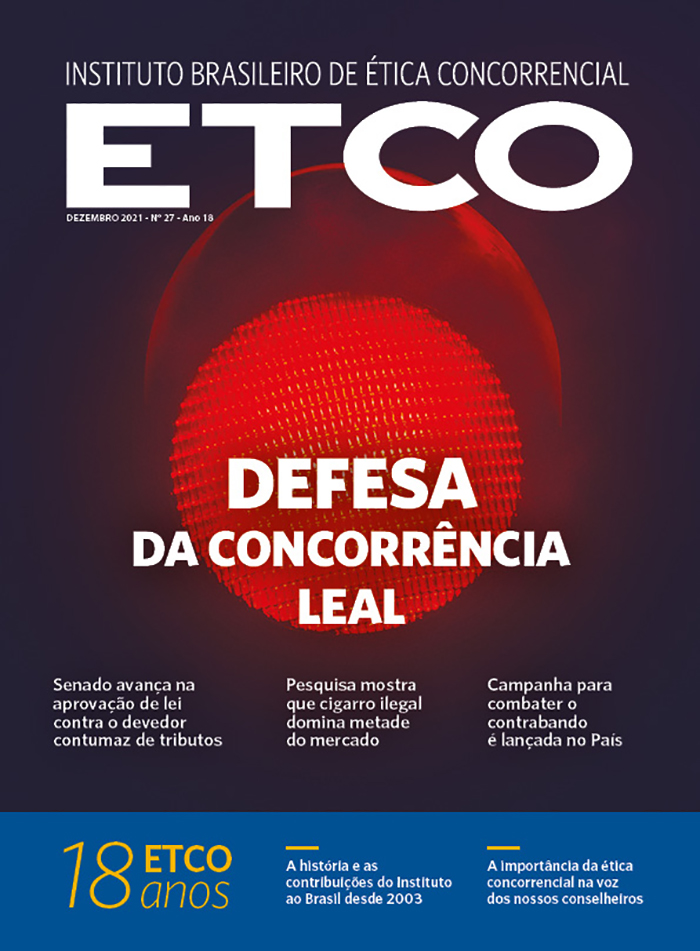The young Marcílio Marques Moreira
A tribute from ETCO to the former president of our Advisory Board, written by journalist and diplomat Pedro Luiz Rodrigues*
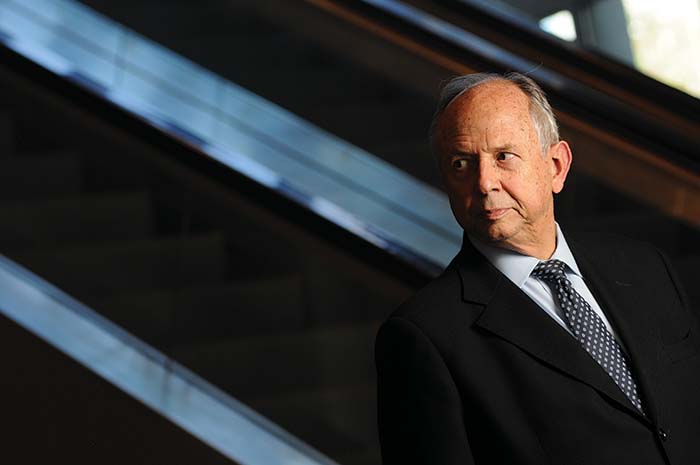
When Marcílio Marques Moreira turned 90 years old, it seemed appropriate to recall, albeit in broad strokes, the initial stages of his professional trajectory, little known even to his friends.
This sketch covers his steps from the end of 1954 – when, at age 23, he entered the diplomatic career – to December 1976, when, at age 45, he was vice president of Unibanco and director of the Center for Social Sciences at the University of Rio de Janeiro, in addition to being a vigorous defender of the principles of democracy and liberalism.
Marcílio entered his career well prepared. Not only was he fluent in English and French, he was also fluent in German, learned in schools in Vienna and Bern, where his father, Ambassador Mário Moreira da Silva, had served. From an early age, he had contact with illustrious patrons of his father's house: Clarice Lispector, Raul Bopp and Antônio Houaiss. At the Rio Branco Institute, he was ranked 1st, in the access competition and in the course. In 1957, he graduated in law.
Following his father's inclination for economic matters, Marcílio was initially assigned to the Economic and Commercial Division of Itamaraty, which he had headed Mário years before. Its first heads were Antônio Corrêa do Lago and Edmundo Barbosa da Silva.
For two years, he participated in the process of creating a multilateral payments system with European countries, replacing the bilateral bands that so limited our trade in the post-war period. Picturesque fact: Marcílio, at one point, acted as a German translator, authorized by his boss, after noticing serious inaccuracies committed by the hired translator.
In December 1956, Jornal do Brasil recorded the marriage of Marcílio and Maria Luiza, at the Igreja Abacial do Mosteiro de São Bento. At the religious ceremony, Marcílio's godparents were Ambassador Paulo Leão de Moura and his wife; those of Maria Luiza, historian João Camillo de Oliveira Torres and Yara Moreira da Silva. Witnesses at the civil ceremony were the groom's parents and the writer José Barreto Filho and his wife, Valquíria. The reception took place at the home of the bride's mother, widow Luiz Camilo de Oliveira Neto. On March 9, 1957, the couple would be removed to Washington.
Washington, the team
Our Embassy in Washington was then headed by Ernani do Amaral Peixoto, a prominent figure in the political scene, married to Alzira Vargas, daughter of Getúlio. Also serving there were Henrique Vale, Ramiro Saraiva Guerreiro (future Chancellor), Maury Gurgel Valente (husband of Clarice Lispector), Francisco de Assis Grieco and Miguel Osório de Almeida. Among the youngest, the team from the economic sector: secretaries Jorge de Seixas Corrêa, Oswaldo Castro Lobo, Geraldo Cavalcanti (who would join the Brazilian Academy of Letters in 2010) and Chancellery officer Zeuxis Neves.
They produced, with great effort, the yearbook Brazil Survey, about the Brazilian situation, in English, whose editions were highly disputed by American government agencies, companies and universities. They also prepared studies on key sectors of trade, investment and tourism. Marcílio participated in both projects, being responsible for the investment area. His work was appreciated, deserving praiseworthy reference by Amaral Peixoto, in a lecture (June 1958) at the Commercial Association of Rio de Janeiro.
However, the Brazil Survey did not last for a long time, published only from 1958 to 1960, the last number being the work of a team made up of diplomats João Paulo do Rio Branco, Oswaldo Lobo, Ronaldo Costa, Otávio Rainho Neves and Sérgio Paulo Rouanet, a friend of Marcílio's .
In Washington, Marcílio and Maria Luiza adopted a frugal lifestyle. At first, they traveled by bus, until the Volkswagen Beetle 1200, imported from Germany, arrived. They also decided not to rent a house, but to buy it, on the long term and at low rates, giving as a down payment the allowance received for the removal. It had been a suggestion by his friend Maury Gurgel Valente. Thus, they began to form their patrimony.
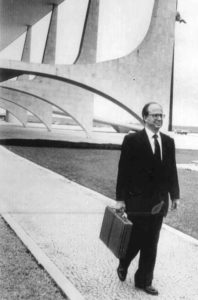
Tireless in work and study, Marcílio added to his responsibilities at the Embassy, a master's course in Political Science at the renowned Georgetown University. He did so slowly, one or two subjects per semester, completing it in 1963, the year of his return to Brazil. In Georgetown (the oldest Catholic institution of higher education in the US), his main inspiration was Professor Heinrich A. Rommen, a German jurist, Catholic opponent of Nazism – which led him to flee Germany and seek asylum in the United States – and renowned social ethical thinker.
Marcílio's decision to study was accompanied by other colleagues and friends. Rouanet joined the same Georgetown. Ronaldo Costa and Oswaldo Lobo opted for American University. A great friend, who had nothing to do with Itamaraty, Olympio Faisol Pinto – who would later become a famous dental surgeon in Rio – also entered Georgetown. Maria Luiza, in turn, although she had already completed the Cultura Inglesa, deepened her study of English.
Tensions increase
Those were busy years, at the Embassy and in Brazil. The country was growing rapidly, but its external accounts were weakened, both because of the low prices of coffee and the sink of currency into which JK's Target Plan had become. It was then up to the Embassy to assure the US government of last resort support.
In early 1958, the Brazilian government turned to the American (via Eximbank) in search of financial support (US$300 million). We were asked for the endorsement of the International Monetary Fund (IMF), but the mission it sent to Brazil – as informed by the Embassy to Itamaraty, on March 31 – “found an even more serious situation than it had supposed”. The money did not come out and an impasse was created, culminating in JK's “breakup” with the IMF. Shortly afterwards Roberto Campos arrived in Washington with instructions to resume negotiations.
In the same year, the Brazilian government proposed to the American the launch of Operation Pan-American (OPA), a program to channel resources for the development of the countries of Latin America. It would be advantageous for Brazil, as it could receive resources, without conditionalities, although an explicit reference was never made to this. All of Latin America mobilized, but the Americans were not enthusiastic. Marcílio even participated in some meetings of the OPA's “Committee of 21”, which led to nothing. Really, only the creation of the Inter-American Development Bank (IDB) in April 1959. This round of negotiations was one of many that took place in Washington during the six years that Marcílio remained there. All following a repeated plot, with the following movements:
▪ In need of dollars, the Brazilian government turned to the American, the IMF or the banks, as happened with JK, in 1958-1959; with Jânio, in 1961; and, in 1963, with João Goulart.
▪ The Fund required an adjustment program from Brazil, the execution of which would be verified by the visit of a technical mission to Brazil. The latter, upon returning, produced an unfavorable report, blocking the negotiations. This is what happened with JK's Monetary Stabilization Program (PEM) and Jânio and João Goulart's adjustment programs.
At that time, only one agreement (stand-by) was reached with the Fund, in May 1961, in the face of unprecedented pressure from the American authorities on that institution.
Marcílio Marques Moreira followed all these negotiations, in which economic and political arguments were raised, and presidents exchanged visits and many letters. Eisenhower went to Brazil to see JK. Kennedy received Jânio and Goulart, and opened his agenda to San Tiago Dantas. In this process, Marcílio gained the professional respect of the parties involved and gained extraordinary experience in complex and high-level negotiations.
In 1958, he published, in English, a work on the Bulls of Pope Alexander VI, highlighting the difference between the mobile borders with which the American pioneers dealt, and the fixed border, inherited by Brazilians, by the Treaty of Tordesillas.
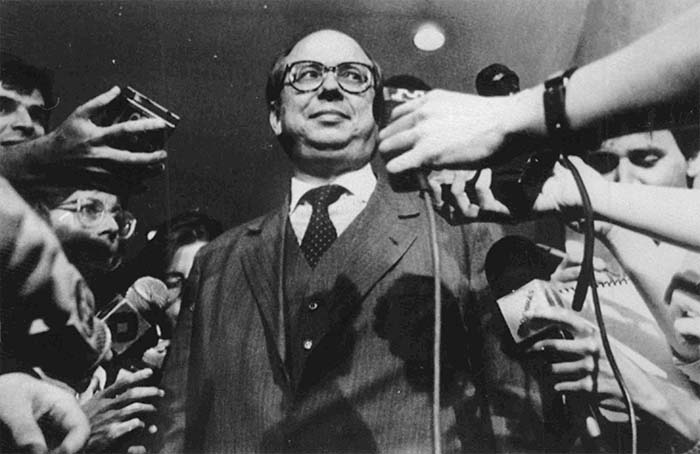
On December 22, 1962, days before the plebiscite that would restore presidentialism in Brazil, Roberto Campos called, at night, John King, Undersecretary for Inter-American Affairs, protesting against a press campaign that the American government was organizing against Goulart. King noted that “later the second secretary Marcílio Moreira, from the Brazilian Embassy called me to discuss what he called a dangerous situation that is being built at the exact moment when we have the best hopes of a definite improvement in our relations and he did also references to negative comments that news agencies had been spreading about the state of Brazil-US relations”. Marcílio had also told him that Ambassador Roberto Campos was beginning to feel boycotted by the US government, as he no longer had access to the Secretaries of State and Treasury.
1963, at the Farm with San Tiago Dantas
A very short period in Marcílio Marques Moreira's professional life, but perhaps what left him the most pleasant memories were the four months – in the first half of 1963 – in which he worked as an advisor to the Minister of Finance, San Tiago Dantas. This one, just inaugurated, had taken drastic measures of adjustment. In Washington, Campos and Marcílio moved and managed to release an “interim aid” worth 30 million dollars, promised by the US for a long time.
In March 1963, San Tiago Dantas went to Washington, where, for three weeks, he met with various American officials, including President Kennedy himself, to whom he delivered a letter from Goulart. Marcílio participated in this meeting. The success of the visit can be judged by the release of a loan of around US$ 400 million, 84 million of which immediately. The rest had their release subject to the evaluation that would make the IMF mission.
Back in Brazil, San Tiago Dantas announced additional adjustment measures, including a 30% currency devaluation; signed a trade agreement with the Soviet Union, worth 585 million dollars, and obtained a definitive solution in the case of the expropriation of the Amforp company. But he found a political environment poisoned by radicalization. San Tiago went on television to explain the agreement with the Americans. In one of these interviews, he referred to the existence, in Brazil, of two lefts: the "positive", of which he would be a part, and the "negative", of those working against the country. On another program, he produced the phrase so dear to Marcílio:“The Fundo is not a good figure as a windmill, so that we can go against it with a spear at the ready, without first identifying its true nature and understanding the scope of what we intend to achieve with it.”
It was late, however. When the IMF mission arrived in Brazil, in May, the plan was already making water. The result was a negative opinion, which interrupted the external debt negotiations initiated by Jânio. Jango removed Celso Furtado from the Planning portfolio and accepted, on June 20, the resignation of San Tiago Dantas, for health reasons.
In 1963, Marcílio completed a master's degree in Political Science at Georgetown University, in Washington, with the thesis Some Social and Political Pre-Conditions for Economic Growth.
Advisor at the BNDE (1963-1965)
Marcílio was invited by the new minister, Carvalho Pinto, to remain in office, but he did not accept. He made a swap with his colleague, diplomat Ronaldo Costa, who had been invited to the BNDE. The latter came to the Treasury, and followed Marcílio to the BNDE, as general adviser to the Department of International Operations.
The role of diplomats outside of Itamaraty had already become customary, and many of them contributed to idealizing and executing our economic development policy, including Otávio Dias Carneiro, Roberto Campos, João Batista Pinheiro, Antônio Corrêa do Lago, Benedito Moreira Fonseca, Evaldo Correia Lima, Miguel Ozorio de Almeida, and Marcílio can also be considered – although younger than the others – as a member of the group.
At BNDE, Marcílio's sector handled the Loan Agreements, signed with agencies such as Eximbank and AID, which included the so-called “Wheat Agreements” with the US. Negotiations were also held with the IDB and with the Credit Institute for Reconstruction of the Federal Republic of Germany, for industrial development. Marcílio also oversaw the creation of the mechanism of coin-agreements for trade between Brazil and the countries of Eastern Europe and took part in the raising of US$4 million from the IDB for the improvement of national graduate centers.
In February 1964, Marcílio participated in the preparatory meetings for the First Conference on Trade and Development (UNCTAD), having the theme of financing under his responsibility. In March, he went to Geneva, where he was when, on the 31st, Goulart was deposed. About this moment, Marcílio would say that despite the military government seeking to break with the postures of “independent foreign policy”, there was no change in the orientation of the Brazilian delegation. There was, indeed, a circle of names at the head of the delegation: Araújo Castro, Jaime Azevedo Rodrigues, Octavio Dias Carneiro, Alfredo Valadão and, finally, Edmundo Barbosa.
In Brazil, Marcílio would also be part of the commissions that negotiated the investment guarantee agreement between Brazil and the USA, and the agreement for the purchase, by the government, of the subsidiaries of the American Foreign Power Company (Amforp). This last commission had been created during the Goulart government and resulted from the steps taken by the mission of San Tiago Dantas to Washington, in March 1963.
Around this time, Marcílio received invitations to teach, and began teaching at PUC-Rio and the Rio Branco Institute, where he was professor of international economics in ten groups of diplomats. He also produced an interesting assessment of the National Financial of Mexico, published in December 1964 in the BNDE magazine, and the article “A Latina between a Revolution and a Alliance”, in February 1965, in Jornal do Brasil.
In Guanabara, idealism in action (1965-1968)
In December 1965, Marcílio Marques Moreira was invited by the governor of Guanabara, Negrão de Lima, to become vice-president of Copeg (Companhia Progresso do Estado da Guanabara), a public company responsible for planning and economic development in the new state.
In this role, he sought solutions to reverse the industrial decline of the city-state, which had been accentuated after the transfer of the federal capital to Brasília. Among these, he took three with greater vigor: to guide the industrial expansion of the city-state towards the West Zone; create a state development bank, and “last but not least”, change the policy on the treatment of favelas in the state. To that end, it created the Working Group (GT) 3881, headed by journalist Sílvio Ferraz.
Ferraz was tasked with coordinating the feasibility studies for the urbanization of the Mata Machado, Morro União and Brás de Pina slums. Data collection was carried out by PUC-Rio and the School of Medicine. The next step would be the creation of Codesco – Community Development Company – announced at the end of 1967 by Marcílio, who would assume its presidency.
Codesco, a subsidiary of Copeg, would act as a mediator between the National Housing Bank (BNH) and the state government to address, in an innovative way, the issue of favelas, “leaving favelados close to their places of work, integrating them in the adjacent community and giving them the right to choose the type of unit for their residence”, said Marcílio when announcing the creation of the company.
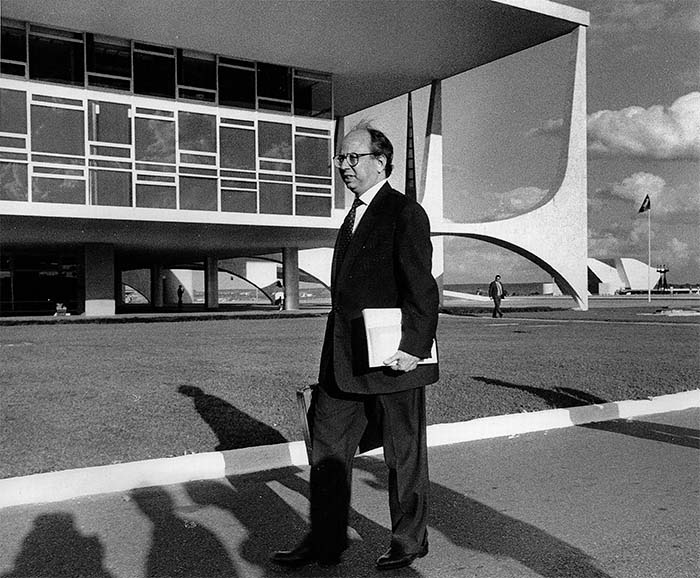
The proposal for participatory urbanization of favelas – for which Brás de Pina served as a model – represented a challenge, as it clashed with the widespread view that the only solution to the “problem” was the removal of their population to distant housing projects. For Marcílio, the favela would be sociologically better structured than a housing complex. In the case of Brás de Pina, the spirit of community was evident when, in 1965, its residents managed to avoid removal and, united, proposed an urbanization plan financed by themselves.
Codesco should be understood as the consolidation, in the orbit of the State of Guanabara, of the work of sociologist José Artur Rios and of the Catholic Church, the origin of the Mutirão Project, of short duration, during the Lacerda government (which preceded that of Negrão de Lima).
The work was carried out in partnership between Codesco – chaired by Marcílio, with Sílvio Ferraz being responsible for the specific project, with the support of architect Gilda Blank – and Quadra, a group made up of architects Carlos Nélson Ferreira dos Santos, Sílvia Wanderley and Rogério Aroeira . As the work was carried out in constant consultation with the communities, Brás de Pina often followed Marcílio on weekends, taking his young daughters, who loved the program.
The experience aroused great interest in Brazil and abroad. The architect and urban planner John Turner, who worked in the “barriadas” of Lima, Peru, was enthusiastic about the experience, having declared, at an event at the Instituto dos Arquitetos do Brasil: “They showed me solutions that are problems and problems that they are solutions”.
Marcílio also brought the Dominican economist and priest Louis-Joseph Lebret, founder of the Economics and Humanism movement, to Brás de Pina, which proposed the expansion of understanding and planning for reform to improve the conditions of the poorer classes.
But the key foreign personality in Brás de Pina was the Spanish priest Artola, who had come to Brazil to take care of the Social Work of the Irmandade de Santa Edwiges, in that community, and who helped to build the bonds of trust between the residents and Codesco.
Marcílio's plans worked in Brás de Pina, but they would not prosper in the other experiments. Certain factors contributed to this result. First, a federal entity, better financially endowed, began operating in the same area: Chisam (Coordination of Social Interest Housing of the Greater Rio Metropolitan Area), which worked with the traditional “removalist” vision of favelas. Furthermore, the initial harmony in the Codesco-Copeg relationship no longer prevails, having been curtailed in budgetary terms.
On the subject, Sílvio Ferraz would say, years later, in an interview, that the simultaneous existence of Codesco, at the state level, and Chisam, at the federal level, was contradictory, and he recalled that Governor Negrão de Lima had told him he could urbanize (the favelas), as long as he didn't brag about it, so as not to provoke the federal government.
In 1968, Marcílio gave a lecture at the State University of Guanabara – from which, in the same year, he assumed the direction of the Institute of Economic, Social and Political Studies – at the opening of the course “Maquiavel and the Beginnings of Modern Political Thought”. He also assumed the financial directorship of the Museum of Modern Art in Rio.
Marcílio, at Unibanco (1968-1983)
At the end of 1968, at the age of 37, Marcílio took an important turn in his professional life, when he accepted the invitation of banker Walter Moreira Salles to take over as vice-president of Unibanco, one of the most respectable and dynamic banking houses of the time. He had lived with Moreira Salles when he was, for the second time, ambassador to Washington (1959-1960) and, later, as foreign debt negotiator, in 1961, in the government of Jânio Quadros.
When he assumed his new position, Brazil was going through a delicate political stage, with his transfer to the bank practically coinciding with the issuance of Institutional Act No. 5 (AI-5), which authorized the President of the Republic to decree the recess of Congress, intervene in States and municipalities, revoke parliamentary mandates, suspend political rights, among other measures.
In addition to attributions in the bank's international area of activity, Marcílio became more “visible” to public opinion, through interviews and lectures (a process he started when at Copeg), in which he acted not only as a spokesperson for Unibanco , but as director of the Institute of Economic and Social Studies at the State University of Guanabara (UEG).
In 1969, he was appointed by the Guanabara government to be part of the Year 2000 Commission, together with his friend Arnaldo Niskier. Other records: UEG Council meetings; the presence at a luncheon that Austregésilo de Ataíde offered Nelson Rockefeller, where he shared a table with Cândido Mendes, Danton Jobim, Luiz Alberto Bahia, Alceu Amoroso Lima and Manuel Francisco do Nascimento Brito, among others. On July 18, he attended the seventh-day mass for the soul of Júlio Mesquita Filho, president of Estadão.
In March 1970, he published an article of great repercussion in Jornal do Brasil: “Financial Market and National Security”, where he stressed “that more important for development than capital accumulation or technological advance is society's trust in the future of the Country and the consequent determination to make it a reality”. According to Marcílio Marques Moreira:
“Since Machiavelli's lessons in his Prince and in Tito Lívio's Discourses on the Decade, which at this point have not lost anything of relevance, it has become a truism that the security of any country rests on the trust of its citizens. No financial complex, however strong and large, is capable of resisting the simultaneous attack of all its depositors, taken by sudden distrust, as no government in history has resisted – no matter how democratic or totalitarian – a sudden withdrawal of support of all his governed. […] It will, therefore, be from the perspective of trust that we will seek to examine the prospects for the Brazilian economy.”
In 1971, Marcílio continued to be approached by the press to talk about Rio de Janeiro. In one of them, he refers to Rio as having “an unmistakable vocation to be the university, cultural and artistic center of Brazil, and that this is a primordial function for the modern process of development”. Marcílio, named as “one of the experts on the problems of Guanabara”, proposes solutions to its economic and social problems. In the II Panel of Debates on the Integrated Action Plan (Guanabara-Rio), he declares that “cariocas should be aware that we are no longer the Federal District, but an autonomous state, with particular problems to solve”.
On November 25, 1971, the date of his 40th birthday, Marcílio Marques Moreira released the book Indicações para um Projeto Brasil, a work in which he sought to reflect his “experience, critical observation and theoretical meditation” on phenomena that involve the problems of development. Parents.
Unibanco grew and Marcílio joined the management or the Advisory Board of companies such as Banco de Investimento do Brasil (BIB), Condomínio Deltec, Crescinco Group, Credibrás, Garantia União Seguradora.
In 1972, he dedicated himself to the international efforts that resulted in the purchase of the Bandeirantes bank, in which Caixa Geral de Depósitos de Portugal was a shareholder. In the same year, BIB teamed up with Daiichi Kangio, from Japan.
In 1973, he participated in conferences at the Getulio Vargas Foundation (“Full employment and optimal allocation of material resources in a dualist economy”) and, at the Escola Superior de Guerra, he spoke on “Diplomacy, Force Policy and Power Policy”.
In 1974, the first year of the Geisel government, Marcílio's public agenda was substantially intensified. He organized, at UEG, some seminars such as “Ecology and Development” (in January), where he observed “it is not the pure and simple diffusion of chimneys that contaminates the air, but the disorderly growth of factories without the indispensable research on the location of units for the protection of the environment”.
In other interviews and lectures, he dealt with themes such as vocational education: “Education must develop the ability to think, create and communicate. With these three skills, the student will not find it difficult to learn a profession”; the merger of the states of Rio and Guanabara; agriculture and food: “the future will be more profoundly marked by an unsatisfied demand for food than by a shortage of fuel” and “(…) a simple change in mentality, management methods, and financial support for production can turn a lot around. large in the agricultural sector, which has always been largely neglected in Brazilian development. This negligence can be verified even by the image of the Ministry of Agriculture, which is very marginalized, forgotten and which does not even control the most important sectors in its area, such as coffee, sugar or production financing”. Also in 1974, Marcílio became a member of the BNDE Council.
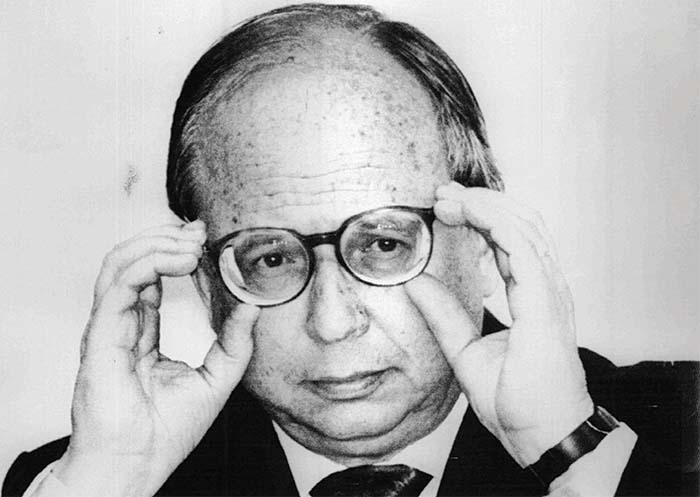
Equally intense was his public agenda in 1975. He opened a conference cycle at UEG: “energy and ecology are closely related to the quality of life, which must be a permanent objective. It would be extremely painful if after several decades of sacrifices we came to the conclusion that we have gone from an underdeveloped country to an underdeveloped country”; wrote an article on education: “We have to stop seeing education as a mere school activity and begin to realize that as important as development is man's preparation for knowledge and the basic techniques of living. It is urgent to open up education in Brazil, which is much more focused on the past than on future trends”; on the links between politics and economics: “There is, however, no determinism between a political model and economic development. Authoritarianism, for example, is not identical with economic development. If it were, we would be witnessing fantastic growth in Russia today. What is felt, however, is that the regime, although successful at one stage, ended up transforming itself into a
onerous liability for society”.
A surprising revelation in the Zózimo column, in Jornal do Brasil on September 25, 1975: “This is Marcílio Marques Moreira of a notorious samba artist.”
In 1976, the last year of this chronology, Marcílio had already become one of the most influential and respected defenders of Brazil's return to democracy.
as a reputable analyst of an economy that would soon face the second oil shock (1979) and would enter a serious balance of payments crisis in the following decade.
On May 30, an editorial note in O Estado de S. Paulo would set the tone of the moment:
“Those who were enthused by the ambiguous feat of the Brazilian regime, achieving social stability while letting institutional instability drag on indefinitely, can prepare to pay the price of this inconsiderate euphoria very early: unshakable, the regime has also become unattractive. A power vacuum is modeled on the generation gap because emerging generations turn their backs on politics, even though they cultivate a political vocation. Arena (government party) has just heard it, without half tones, from the director of the Center for Social Sciences of the University of Rio de Janeiro, professor Marcílio Marques Moreira, at the seminar promoted by the Milton Campos Foundation.”
In the same lecture, he made a masterful defense of liberalism:
“The liberal, today, is regarded with suspicion, both on the left and on the right. He is even considered an obsolete man, who lacks pragmatism, who at best bears witness to nostalgia. However, and the most vital societies, such as the North American one, show this, liberalism, by placing human development at the center of its concern, both political and economic, is a latent force of great vigor and great importance for societies not to fall into a stage of entropy and lack of creativity.”
* Pedro Luiz Rodrigues is a journalist and career diplomat. He served at the Brazilian Embassies in Dhaka, Washington, Asuncion, Buenos Aires, Tel-Aviv and Paris. He was ambassador of Brazil to Nigeria. He was an economics reporter for Jornal do Brasil and O Estado de São Paulo, and director of the Brasília branch of the latter. During the government, he was spokesman for Itamaraty, Marcílio (at the Embassy in Washington and at the Ministry of Economy) and two finance ministers (Ernane Galvêas and Pedro Malan). He was named undersecretary of press to President Tancredo Neves, press secretary to President Fernando Collor and international director of the Presidency of the Senate. In the private sector, he was a partner at Flecha de Lima Institutional Relations and communication director at Febraban. He is part of Campo's Advisory Board and regularly writes for the Diário do Poder.



